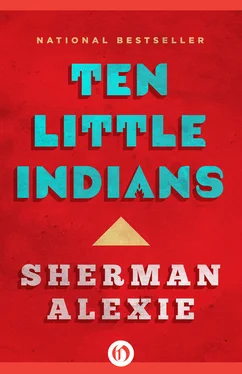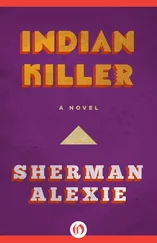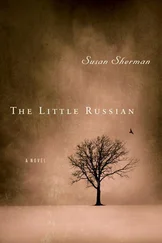“How’d you know it was your mother?” Corliss asked.
“I don’t know,” he said. “I just knew. I mean, she looked like me. I looked like her. But there was something else, too. I felt connected. And she started coughing. I was parked fifty feet away, but I could hear her coughing so loud. She was retching up stuff and spitting it on the sidewalk. And it was the saddest thing I’d ever seen. And this was my mother. This was the woman who gave birth to me, who’d left me behind. I felt sorry for her and loved her and hated her all at the same time, you know?”
Corliss knew about mothers and their difficult love.
“I opened the door and got out. I was going to walk across the street and stop her and say to her — I’d rehearsed it all — I was going to say, ‘Mother, I am your son.’ Basic, simple, clean. Nothing dramatic. Still, I thought even that simple statement might kill her. I keep thinking I might shock her into a heart attack, she looked so frail and weak. I’m walking across the street toward her, and she’s coughing, and I’m getting closer, and then she reaches into her pocket, pulls out this crack pipe and a lighter, and she lights up right there in the middle of the street. Broad daylight. She lights up and sucks the crap in. And I kept walking right past her, came within a foot of her, you know. I could smell her. She didn’t even look at me. She just kept sucking at that pipe. Old Indian woman sucking on a crack pipe. It was sad and ridiculous, but you know the worst part?”
“What?” Corliss asked.
Harlan stood and walked down the aisle away from Corliss. He spoke with his back to her.
“I was happy to see my mother like that,” he said. “I was smiling when I walked away from her. I just kept thinking how lucky I was, how blessed, that this woman didn’t raise me. I just kept thinking God had chosen me, had chosen these two white people to swoop in and save me. Do you know how terrible it is to feel that way? And how good it feels, too?”
“I don’t have any idea how you feel,” Corliss said. Her confusion was the best thing she could offer. What could she say to him that would matter? She’d spent her whole life talking. Words had always been her weapon, her offense and defense, and she felt that her silence, her wordlessness, might be the only thing she could give him.
“The thing is,” he said, “the two best, the two most honorable and loyal people in my life are my white mother and my white father. So, you tell me, kid, what kind of Indian does that make me?”
Corliss knew only Harlan could answer that question for himself. She knew the name of her tribe, and the name of her archaic clan, and her public Indian name, and her secret Indian name, but everything else she knew about Indians was ambiguous and transitory.
“What’s your name?” she asked him. “What’s your real name?”
Harlan Atwater faced her. He smiled, turned away, and walked out of the store. She could follow him and ask for more. She could demand to know his real name. She could interrogate him for days and attempt to separate his truth from his lies and his exaggerations from his omissions. But she let him go. She understood she was supposed to let him go. And he was gone. But Corliss sat for hours in the bookstore. She didn’t care about time. She was tired and hungry, but she sat and waited. Indians are good at waiting, she thought, especially when we don’t know what we’re waiting for. But there comes a time when an Indian stops waiting, and when that time came for Corliss, she stood, took Harlan Atwater’s book to the poetry section, placed it with its front cover facing outward for all the world to see, and then she left the bookstore and began her small journey back home.
MY FATHER IS AN African American giant who played defensive end for the University of Washington Huskies, and my mother is a petite Spokane Indian ballerina who majored in dance at U-Dub, so genetically speaking, I’m a graceful monster. But my father spent more time reading Frantz Fanon and Angela Davis than pumping iron in the weight room, and my mother played supernatural point guard for an all-Native women’s barnstorming basketball team, so culturally speaking, I’m a biracial revolutionary leftist magician with a twenty-foot jumper encoded in my DNA.
I grew up in Seattle, played basketball at Ballard High School, and attended North Seattle Community College on a partial athletic scholarship. But I soon grew bored of school and small ball. I played backup power forward — averaging seven points and five rebounds a game — on a crappy team in the middle of a forty-seven-game losing streak, and I’d taken all of the college-prep courses in high school and had earned eighteen college credits through the Advanced Placement tests. I was underqualified for CC basketball and overqualified for CC academics. Don’t get me wrong. I think United States community colleges are the most successful models of socialism in the history of the world, but I was already an intellectual gladiator eager to do battle with the capitalistic lions. I quit the basketball team, transferred to the University of Washington, my folks’ alma mater, and earned a summa cum laude BA in political science while playing rat ball at the intramural gym five or six days a week. I still loved basketball and was a better hoopster than 99 percent of the dudes I faced, but I had better things to do and be.
During college, I interned for Norm Rice, the first African American mayor of Seattle; after graduation, I went to work for Gary Locke, the first Chinese American governor in United States history. I am currently Locke’s executive liaison to Washington State’s twenty-nine Indian tribes, which are growing in political power due to casino revenues, and I also manage the Native Voices Now! voter-registration drive. Let me tell you, that is a tough gig. Do you know how difficult it is to get Indians to trust any politician? In the long history of treaty making and treaty breaking, there have been no significant differences between Democrats and Republicans. I hate to say it, but many Native American politicians are as corrupt and self-serving as any white D or R. So Indian voters don’t trust Indian politicians any more than the white variety.
In that regard, Governor Locke is an original. No matter how much Indian tribes might agree or disagree with his policies, he can’t be judged on a long history of Chinese American oppression of Native Americans. Locke and his staff were smart enough to hire me, the superstar half-Indian boy, to do most of his tribal communication. That hasn’t been easy. Let me tell you a dirty secret: Quite a few of the state’s most powerful Indian men and women are functionally illiterate. There are tribal councilmen who cannot spell the word “sovereignty.” It’s true. The best and brightest Indian folks are not often tribal leaders. A genius Indian is a rare and powerful person, wanted by every college and corporation. A genius Indian is the homecoming king or queen of the private-sector prom. But let’s tell more of the truth, okay? The best and brightest white men and women don’t become our mayors and governors and presidents, either. Otherwise, Bill Gates would be in the Oval Office, and Martha Stewart would be secretary of state. Think about it. The current United States president graduated from Yale with a 77 percent average. If white folks can survive with a C-plus commander in chief, then Indian folks can survive with a GED tribal chief. But here’s a personal truth: I am tired of surviving the incompetent, the average, the mean and median. I want excellence. I want to be a good man and a great politician who makes promises and keeps them. I am one of the best and brightest Native Americans and one of the best and brightest African Americans, and I am ambitious, so I plan on becoming the first half-black half-Indian United States senator. After three or four terms in the Senate, I’ll go for the White House. That is my general life plan, but general life plans often go awry. After all, in third grade, John F. Kennedy and Lee Harvey Oswald both wanted to be U.S. president, and look what happened to them. It’s the details of any life that are most important, right? Let me tell you about one dinner party and one basketball game.
Читать дальше












